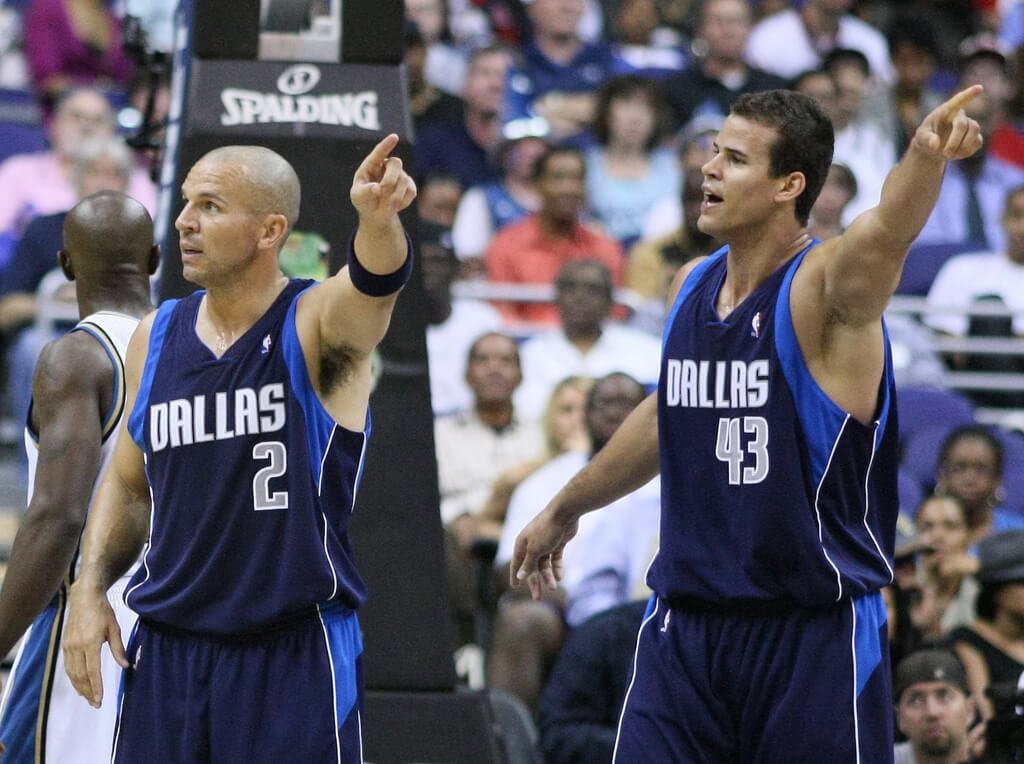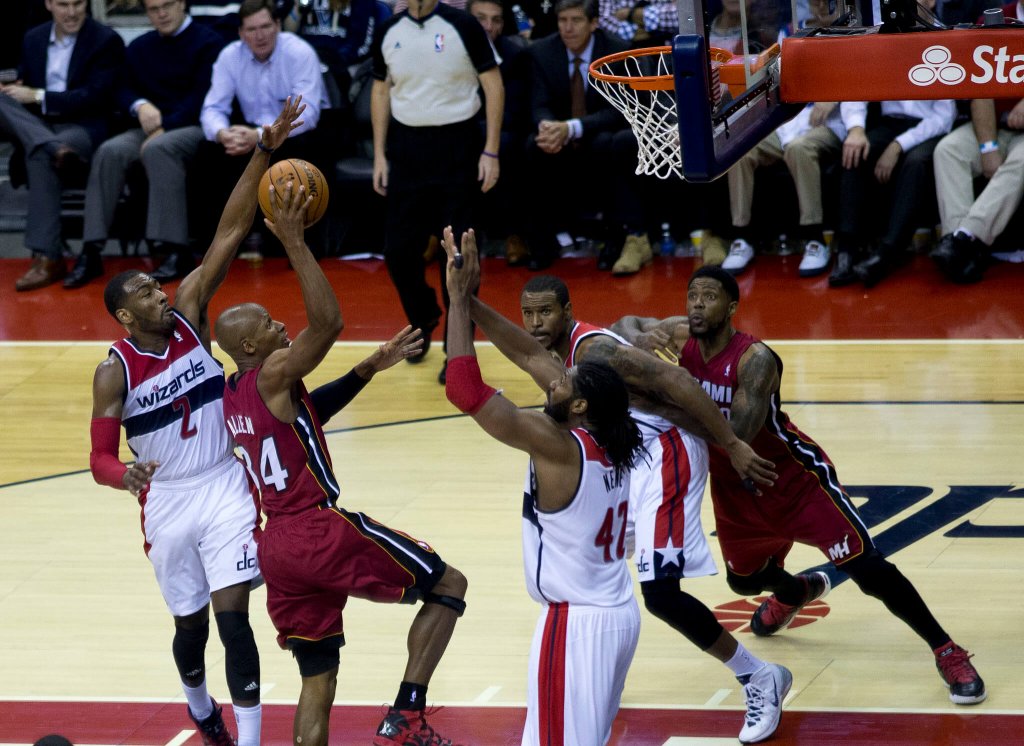Basketball Hall of Fame Odds: Make Room for Kidd and Nash

- Steve Nash and Jason Kidd headline this year’s crowded Hall of Fame class.
- Will Chris Webber sneak in after being snubbed in his first year of eligibility?
- Will voters look past Grant Hill’s disastrous tenure in Orlando?
Over the years, Jason Kidd and Steve Nash have shared a backcourt and a locker room. In a few more months they could also be sharing the dais at the Naismith Basketball Hall of Fame.
The former teammates were recently named as finalists for the Hall’s crowded class of 2018 alongside Grant Hill, Ray Allen, Chris Webber, and Maurice Cheeks. In order to be inducted, finalists must receive 18 votes from the 24-member Honor Committee. Although there is with no hard cap for induction, it’s unlikely that more than three players will be enshrined in any given year.
We’ve examined each player’s candidacy and have come up odds on who will be called to the Hall and who will be snubbed. Make sure to view our most trusted sportsbooks later this month to see if these wagers are available.
| Nominee | Odds |
|---|---|
| Steve Nash | 1/100 |
| Jason Kidd | 1/100 |
| Grant Hill | 2/3 |
| Ray Allen | 3/1 |
| Chris Webber | 9/1 |
| Maurice Cheeks | 15/1 |
Steve Nash
You’d be hard-pressed to find a more beloved teammate than Steve Nash, who repeatedly led the league in assists, high fives, and compliments during his storied 18-year career. The upbeat Canadian played the game with an effusive joy that rubbed off on all of his teammates and endeared him to fans around the world.
Nash’s peak seasons came in 2004-05 and 2005-06 when he led the league in dimes and became the first point guard since Magic Johnson to win two MVP awards. And while his gaudy assist totals were impressive, it was his shooting that truly set him apart. Nash recorded four 50-40-90 seasons and is the NBA’s all-time leader in free throw percentage at .904.
Some will knock his lack of titles, but that didn’t prevent fellow MVPs like Charles Barkley and Karl Malone from enshrinement. Nash will doubtlessly make the Hall a better place, just as he has with every other venue he’s graced.

Jason Kidd
Long before Lonzo Ball and Ben Simmons, Jason Kidd was the original do-it-all, stat-stuffing point guard. The ten-time All-Star ranks third in career triple doubles with 107 and he led his teams to the playoffs in 17 of his 21 seasons. Kidd peaked statistically in 2003, but his greatest moment came in 2011 when he helped the Mavs defeat the heavily-favoured Heat to win their first championship in franchise history. Take Kidd off of that team and they almost certainly would have been swept in the first round by the Blazers.
As good as he was in the NBA, J-Kidd was even better on the international stage, where he compiled a perfect 58-0 record with the senior men’s team from 1999 to 2008.
As good as he was in the NBA, J-Kidd was even better on the international stage, where he compiled a perfect 58-0 record with the senior men’s team from 1999 to 2008 and was the starting point guard on five gold medal-winning squads. His overall body of work makes him a lock for induction.
Grant Hill
Are six peak seasons enough to qualify for the Hall of Fame? That’s the question voters will have to ask themselves when considering the candidacy of Grant Hill, who missed 200 regular-season games during his disastrous tenure with Orlando, and nearly died from a surgery-related infection in 2003.
Hill’s lost years with the Magic may make some voters think twice, but they shouldn’t overshadow what he accomplished in Detroit, where he was considered by many to be the heir apparent to Michael Jordan. Hill shared Rookie of the Year honors with Kidd during his freshman campaign, and went on to average 21.5 points, 7.8 rebounds, 6.2 assists, and 1.6 steals per game during his first six seasons. Like Bill Walton before him, Hill deserves a spot in the Hall based upon the brilliance he exhibited during the first half of his career. His body may have let him down, but his dedication and love for the game never abated.
Ray Allen
You can’t discuss the game’s greatest shooters without mentioning Ray Allen. The UConn alum led the league in three-pointers on three occasions and ranks first all-time in three-point field goals made and taken. Those records will eventually be broken by Steph Curry or Klay Thompson, but for now at least, he remains the undisputed king of long distance shots.
The ten-time All-Star became something of a hired gun during the second half of his career, helping the Celtics and Heat to win championships. Despite his contributions he remains persona non grata in Boston after fleeing the city in free agency, and that may weigh on voters’ minds. His inability to win a title on his own in Milwaukee and Seattle also counts as a black mark against his otherwise stellar accomplishments. Allen will likely make it into the Hall eventually, but it won’t be in 2018.

Chris Webber
In many ways, Chris Webber is the anti-Jason Kidd: a heavily-hyped player who never managed to win despite being surrounded by exceptional talent. C-Webb fell famously short in a pair of NCAA championship games despite playing with the best teammates boosters could buy, and he consistently came up empty-handed in the NBA playoffs despite being surrounded by All-Star talent. Put Kidd on those Sacramento teams from 2000 to 2005 and you would have had an NBA dynasty.
Players don’t need to have a championship on their C.V. to make it into the Hall of Fame, but they’d better have phenomenal statistics to support their cause.
Players don’t need to have a championship on their C.V. to make it into the Hall of Fame, but they’d better have phenomenal statistics to support their cause. Webber’s career averages (20.7 points, 9.8 rebounds, 4.2 assists) are certainly good, but are they truly Hall-worthy? Players like Tom Chambers, Elton Brand, and Shawn Kemp put up similar stats during their primes, and none of them are likely to make it into the Hall unless they buy a ticket. In Kemp’s defense, if there’s a Hall of Fame for Absentee Fathers, he’s a slam dunk for induction.
Webber came up short during his first year of eligibility and will very likely miss out again in 2018.
Maurice Cheeks
Maurice Cheeks’ name may be less familiar to modern basketball fans, but he absolutely deserves to be on this list. The six-foot-one floor general was a four-time All-Star and five-time All-Defensive team member who wore down opposing players with his quick hands and physicality. He finished in the top ten in steals ten times during his 16-year career, and was the starting point guard on Philadelphia’s 1983 championship team. Granted, Dr. J and Moses Malone both played bigger roles on that squad, but the Sixers never would have made it past Boston and Milwaukee without Cheeks’ heady play.
Cheeks also deserves some love for his coaching chops. The Chicago native led Portland to a 50-win season in 2003 and has been on the bench in OKC for seven of the last eight seasons. He won’t get in this year (or likely ever), but it’s only fair that his tremendous contributions to the game be recognized.


